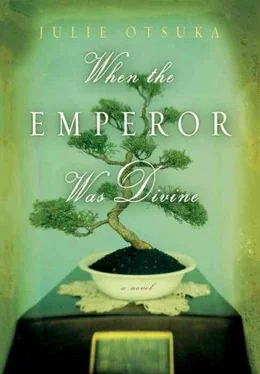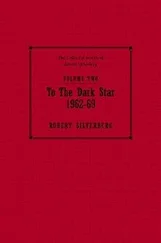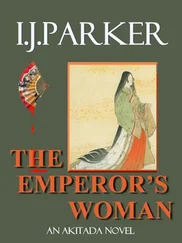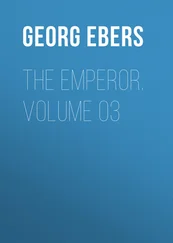A MEMORY FROM BEFORE: his sister arriving home from school with her new jump rope trailing behind her on the sidewalk. “They let me turn the handle,” she said, “but they wouldn’t let me jump.” She had cut the rope up into tiny pieces and tossed them into the ivy and sworn she would never jump rope again.
EVERY WEEK they heard new rumors.
The men and women would be put into separate camps. They would be sterilized. They would be stripped of their citizenship. They would be taken out onto the high seas and then shot. They would be sent to a desert island and left there to die. They would all be deported to Japan. They would never be allowed to leave America. They would be held hostage until every last American POW got home safely. They would be turned over to the Chinese for safekeeping right after the war.
You’ve been brought here for your own protection, they were told.
It was all in the interest of national security.
It was a matter of military necessity.
It was an opportunity for them to prove their loyalty.
THE SCHOOL WAS OPENED in mid-October. Classes were held in an unheated barrack at the far end of Block 8 and in the morning it was sometimes so cold the boy could not feel his fingers or toes and his breath came out in small white puffs. Textbooks had to be shared, and paper and pencils were often in short supply.
Every morning, at Mountain View Elementary, he placed his hand over his heart and recited the pledge of allegiance. He sang “Oh, beautiful for spacious skies” and “My country, ’tis of thee” and he shouted out “Here!” at the sound of his name. His teacher was Mrs. Delaney. She had short brown hair and smooth creamy skin and a husband named Hank who was a sergeant in the Marines. Every week he sent her a letter from the front lines in the Pacific. Once, he even sent her a grass skirt. “Now when am I ever going to wear a grass skirt?” she asked the class.
“How about tomorrow?”
“Or after recess.”
“Put it on right now!”
The first week of school they learned all about the Nina and the Pinta and the Santa Maria, and Squanto and the Pilgrims at Plymouth Rock. They wrote down the names of the states in neat cursive letters across lined sheets of paper. They played hangman and twenty questions. In the afternoon, during current events, they listened to Mrs. Delaney read out loud to them from the newspaper. The First Lady is visiting the Queen in London. The Russians are still holding in Stalingrad. The Japs are massing on Guadalcanal.
“What about Burma?” the boy asked.
The situation in Burma, she told the class, was bleak.
LATE AT NIGHT he heard the sound of the door opening, and footsteps crossing the floor, and then his sister was suddenly there by the window, flipping her dress up high over her head.
“You asleep?”
“Just resting.” He could smell her hair, and the dust, and salt, and he knew she’d been out there, in the night, where it was dark.
She said, “Miss me?” She said, “Turn down the radio.” She said, “I won a nickel at bingo tonight. Tomorrow we’ll go to the canteen and buy you a Coca-Cola.”
He said, “I’d like that. I’d like that a lot.”
She dropped down onto the cot next to his. “Talk to me,” she said. “Tell me what you did tonight.”
“I wrote Papa a postcard.”
“What else?”
“Licked a stamp.”
“Do you know what bothers me most? I can’t remember his face sometimes.”
“It was sort of round,” said the boy. Then he asked her if she wanted to listen to some music and she said yes—she always said yes—and he turned on the radio to the big band channel. They heard a trumpet and some drums and then Benny Goodman on the clarinet and Martha Tilton singing, “So many memories, sometimes I think I’ll cry….”
IN THE DREAM there was always a beautiful wooden door. The beautiful wooden door was very small—the size of a pillow, say, or an encyclopedia. Behind the small but beautiful wooden door there was a second door, and behind the second door there was a picture of the Emperor, which no one was allowed to see.
For the Emperor was holy and divine. A god.
You could not look him in the eye.
In the dream the boy had already opened the first door and his hand was on the second door and any minute now, he was sure of it, he was going to see God.
Only something always went wrong. The doorknob fell off. Or the door got stuck. Or his shoelace came untied and he had to bend over and tie it. Or maybe a bell was ringing somewhere—somewhere in Nevada or Peleliu or maybe it was just some crazy gong bonging in Saipan—and the nights were growing colder, the sound of the scrabbling claws was fainter now, fainter than ever before, and it was October, he was miles from home, and his father was not there.
THEY HAD COME for him just after midnight. Three men in suits and ties and black fedoras with FBI badges under their coats. “Grab your toothbrush,” they’d said. This was back in December, right after Pearl Harbor, when they were still living in the white house on the wide street in Berkeley not far from the sea. The Christmas tree was up, and the whole house smelled of pine, and from his window the boy had watched as they led his father out across the lawn in his bathrobe and slippers to the black car that was parked at the curb.
He had never seen his father leave the house without his hat on before. That was what had troubled him most. No hat. And those slippers: battered and faded, with the rubber soles curling up at the edges. If only they had let him put on his shoes then it all might have turned out differently. But there had been no time for shoes.
Grab your toothbrush.
Come on. Come on. You’re coming with us.
We just need to ask your husband a few questions.
Into the car, Papa-san.
Later, the boy remembered seeing lights on in the house next door, and faces pressed to the window. One of them was Elizabeth’s, he was sure of it.
Elizabeth Morgana Roosevelt had seen his father taken away in his slippers.
THE NEXT MORNING his sister had wandered through the house looking for the last place their father had sat. Was it the red chair? Or the sofa? The edge of his bed? She had pressed her face to the bedspread and sniffed.
“The edge of my bed,” their mother had said.
That evening she had lit a bonfire in the yard and burned all of the letters from Kagoshima. She burned the family photographs and the three silk kimonos she had brought over with her nineteen years ago from Japan. She burned the records of Japanese opera. She ripped up the flag of the red rising sun. She smashed the tea set and the Imari dishes and the framed portrait of the boy’s uncle, who had once been a general in the Emperor’s army. She smashed the abacus and tossed it into the flames. “From now on,” she said, “we’re counting on our fingers.”
The next day, for the first time ever, she sent the boy and his sister to school with peanut butter and jelly sandwiches in their lunch pails. “No more rice balls,” she said. “And if anyone asks, you’re Chinese.”
The boy had nodded. “Chinese,” he whispered. “I’m Chinese.”
“And I,” said the girl, “am the Queen of Spain.”
“In your dreams,” said the boy.
“In my dreams,” said the girl, “I’m the King.”
IN CHINA the men wore their hair in long black pig-tails and the ladies hobbled around on tiny broken feet. In China there were people so poor they had to feed their newborn babies to the dogs. In China they ate grass for breakfast and for lunch they ate cats.
And for dinner?
For dinner, in China, they ate dogs.
Читать дальше












